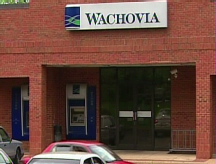WaMu swap sellers sidestep big loss
Investors who sold default protection on failed Seattle-based thrift appear face much smaller loss than those who bet on Lehman Brothers.
NEW YORK (CNNMoney.com) -- Investors who wagered that Washington Mutual would somehow survive the latest market turmoil will have to pay far less than some had feared.
According to the final results of an auction of complex financial instruments called credit default swaps held Thursday, banks and other investors who sold these insurance-like products will have to pay 43 cents on the dollar to investors who bet that WaMu would default on its debt, according to Creditfixings.com.
"This is still a considerably higher recovery than many anticipated only a few weeks ago when [WaMu] bonds were trading in the 20s," said Tim Backshall, chief strategist at Credit Derivatives Research.
At those prices, sellers would have had to pay out as much as 80 cents on the dollar.
The final figures were higher than preliminary estimates from Creditfixings.com of a payout of about 36 cents on the dollar, but far below what happened at a similar auction held earlier this month regarding Lehman Brothers.
Investors who bet on the fallen Wall Street firm lost more than 91 cents on the dollar on credit default swap contracts.
Credit default swaps act as a form of insurance. Corporate bondholders sometimes purchase these products to protect themselves in case a company is unable to make their debt payments or goes bankrupt, as was the case with both WaMu and Lehman Brothers.
Other investors also use credit default swaps -- even if they don't own the company's debt -- as a way to make side bets about a company's health.
Investors feared during the Lehman Brothers auction on October 10 that troubles in the credit default swap could have exacerbated the recent turmoil in broader financial markets.
Stocks were whipsawed that day and some traders blamed concerns about the auction and the impact it would have on many already struggling banks for much of the volatility that day.
Yet buyers and sellers of Lehman credit default swaps managed to settle those claims earlier this week without any major fallout amongst financial institutions or the broader market, which many feared could happen.
Just $5.2 billion is expected to trade hands between investors that bet on a Lehman default, according to the Depository Trust and Clearing Corporation, which handles trades in over-the-counter markets such as credit default swaps, as some institutional investors both bought and sold credit default swaps.
Still, Thursday's auction offered yet another glimpse at this long-ignored market, which some estimate to be worth $55 trillion.
Over 500 parties participated in Thursday's WaMu auction, including major global financial institutions such as Bank of America (BAC, Fortune 500), Barclays (BCS), Citigroup (C, Fortune 500) and Goldman Sachs (GS, Fortune 500).
That number dwarfed the more than 350 banks and investors that took part in Lehman's auction. What remains unclear is whether the payments related to the WaMu's credit default swaps will surpass that of Lehman.
Yet in some ways, Thursday's auction brings the WaMu tale one step closer to the end.
Saddled by toxic home loans, WaMu struggled for months and tried numerous remedies to shore up its problems, including a $7 billion private equity investment and the expulsion of long-time CEO Kerry Killinger.
But fallout in the U.S. mortgage market and waning confidence in the company proved too much for the Seattle-based thrift.
Washington Mutual (WM, Fortune 500) collapsed on Sept. 29, making it the biggest bank failure in the nation's history. Federal regulators seized the company's banking operations, only to turn around and sell them to JPMorgan Chase (JPM, Fortune 500) for $1.9 billion. ![]()


